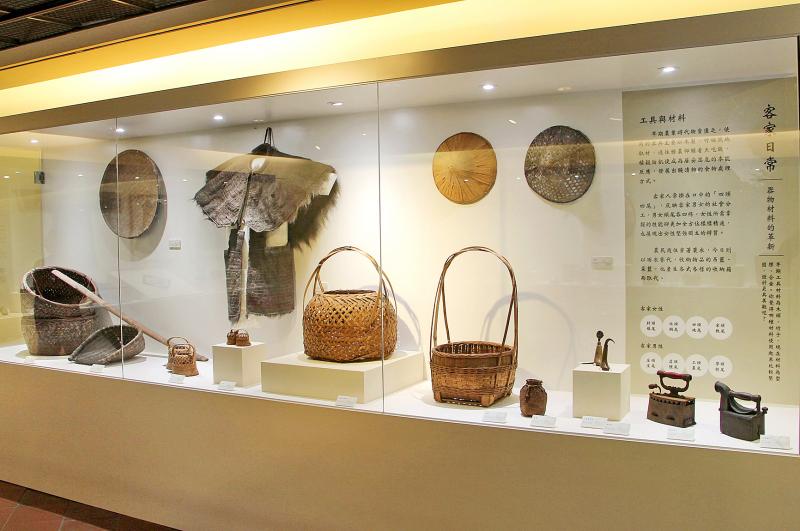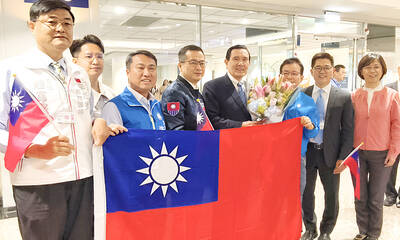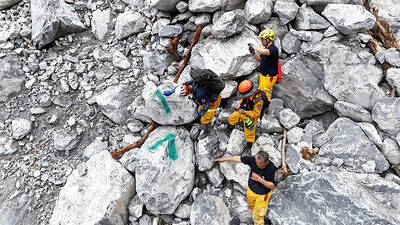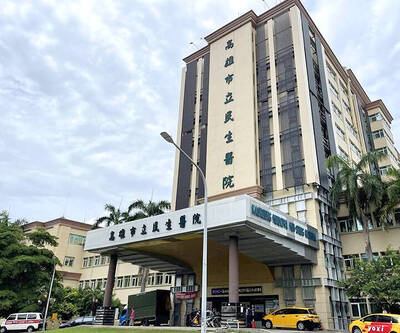The New Taipei City Hakka Museum is until June 15 holding a special exhibition of everyday objects utilized in traditional Hakka culture.
The household objects include tools, clothes, religious artifacts, utensils and musical instruments, the city’s Hakka Affairs Department said in a news release on May 13, adding that the artifacts embody the Hakka virtues of practicality, sturdiness and frugality.
One of the items on exhibit is qisi mao (氣死貓), a bamboo food basket that can be suspended from the beam of the house via a loop to protect its content from cats and mice, it said.

Photo courtesy of the New Taipei City Hakka Affairs Department
The vase-like container has a tapering mouth that can be sealed with a lid and its loop can also be used as a handle, it added.
Another object on display is a container made of rattan with a tight spiral weave resembling a bird’s nest that can hold a pot of tea and help it retain heat for a longer period, it said.
The exhibition also features traditional women’s clothing, which were loosely fitted for ease of movement, comfort and functionality, it said.
These clothes include lan shan (藍衫), a typically blue, knee-length upper garment that has an opening on the right side, and da tang ku (大襠褲), which is a straight-cut lower garment that resembles baggy trousers, it said.
A children’s hat called feng mao (風帽) has a flap that protects the neck from the cold, it said.
Hakka utensils on display include a collection of colorful rice bowls, the department said, adding that these ceramic vessels played an important symbolic role in family life and were frequently exchanged as gifts.
Other objects on display include a fisher’s basket, a straw raincoat and hat, a dustpan and a carrying rod.

Former president Ma Ying-jeou’s (馬英九) mention of Taiwan’s official name during a meeting with Chinese President Xi Jinping (習近平) on Wednesday was likely a deliberate political play, academics said. “As I see it, it was intentional,” National Chengchi University Graduate Institute of East Asian Studies professor Wang Hsin-hsien (王信賢) said of Ma’s initial use of the “Republic of China” (ROC) to refer to the wider concept of “the Chinese nation.” Ma quickly corrected himself, and his office later described his use of the two similar-sounding yet politically distinct terms as “purely a gaffe.” Given Ma was reading from a script, the supposed slipup

The bodies of two individuals were recovered and three additional bodies were discovered on the Shakadang Trail (砂卡礑) in Taroko National Park, eight days after the devastating earthquake in Hualien County, search-and-rescue personnel said. The rescuers reported that they retrieved the bodies of a man and a girl, suspected to be the father and daughter from the Yu (游) family, 500m from the entrance of the trail on Wednesday. The rescue team added that despite the discovery of the two bodies on Friday last week, they had been unable to retrieve them until Wednesday due to the heavy equipment needed to lift

Former Czech Republic-based Taiwanese researcher Cheng Yu-chin (鄭宇欽) has been sentenced to seven years in prison on espionage-related charges, China’s Ministry of State Security announced yesterday. China said Cheng was a spy for Taiwan who “masqueraded as a professor” and that he was previously an assistant to former Cabinet secretary-general Cho Jung-tai (卓榮泰). President-elect William Lai (賴清德) on Wednesday last week announced Cho would be his premier when Lai is inaugurated next month. Today is China’s “National Security Education Day.” The Chinese ministry yesterday released a video online showing arrests over the past 10 years of people alleged to be

MIX-UP: Kaohsiung Municipal Min-Sheng Hospital director Yen Chia-chi was suspended from his duties after surgeons operated on the wrong patient last week The Kaohsiung Department of Health yesterday fined Kaohsiung Municipal Min-Sheng Hospital NT$500,0000 for misidentifying two patients and consequently causing one of them to undergo the wrong surgery last week. The hospital’s director Yen Chia-chi (顏家祺) was suspended from his duties. The surgeon who was scheduled to operate on the patient was given a major demerit and is subject to subsequent disciplinary actions. Demerits were given to the anesthesiologist, the nurse in the operation room, the nurse in the ward and the worker who helped transfer the patient from the ward to the operation room for having failed to verify the patient’s identity. Meanwhile, the